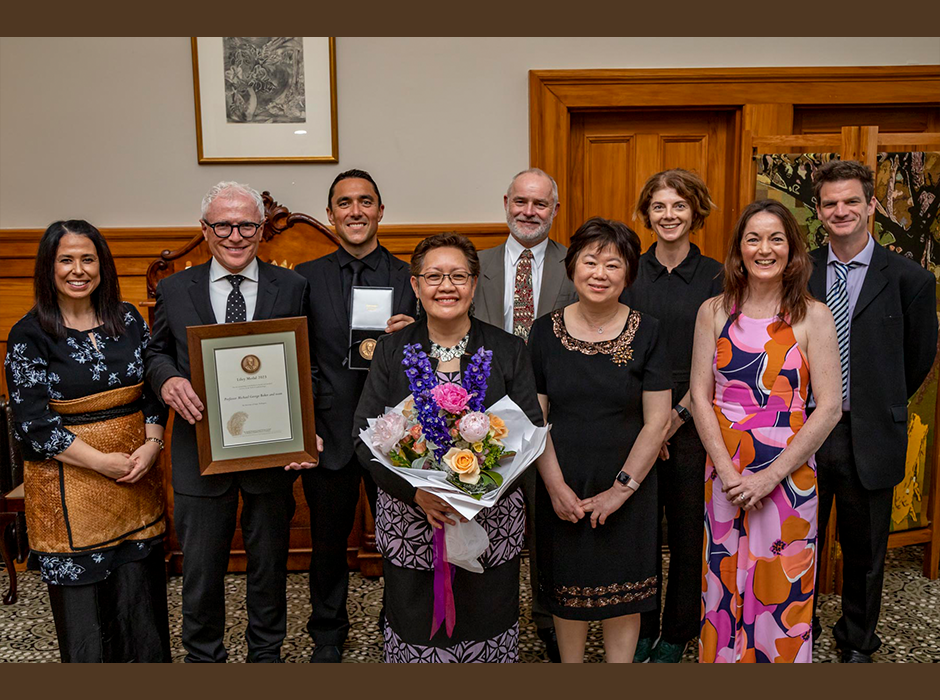
Leading epidemiologist Professor Michael Baker and his research team have been recognised for their outstanding contribution to health and medical services.
Professor Baker, of the University of Otago, Wellington, Department of Public Health, and his team received the Health Research Council’s Liley Medal at the Royal Society Te Apārangi Research Honours ceremony at Government House tonight.
The Medal is awarded annually to an individual or research team whose recent research produced a significant breakthrough within the health and medical fields.
The team published two papers which highlight a major development in understanding the causes of acute rheumatic fever and the role of preceding Group A Streptococcal infections.
HRC Chief Executive Professor Sunny Collings says the studies, which involved a “long list of talented and internationally recognised scientists, are among the most rigorous to identify risk factors for rheumatic fever”.
“They provide a very strong base to help guide the goal of eliminating this devastating disease as a global health problem,” Professor Collings says.
Professor Baker was thrilled the team was acknowledged for the quality and impact of the research.
“These two studies were challenging to carry out. They required a massive effort by a large group of researchers and clinicians who worked with communities for more than a decade to plan them, do the field work, and then write up and publish the findings.
The research used two case-control studies – one looking at the risk factors for acute rheumatic fever and the other investigating risk factors for the strep bacterial infections (strep sore throats and strep skin infections) which cause rheumatic fever.
Professor Baker says it was the first time anyone had looked at the causes of rheumatic fever with two studies of this type.
“The rheumatic fever study found that disease risk was strongly associated with living in a crowded household, barriers to seeing a doctor, drinking sugar sweetened drinks, a family history of rheumatic fever, and a preceding history of throat or skin infection,” he says.
“The strep infection study found that strep skin infection was also associated with barriers to seeing a doctor, household crowding and a family history of rheumatic fever, unlike strep sore throat that was only associated with barriers to health care.”
The research identified potential new ways to prevent rheumatic fever, such as focusing on effective treatment of skin infections and encouraging children to drink healthy alternatives to sugar sweetened drinks.
“These findings reinforce the central role that good quality, uncrowded housing has in protecting children during the period when they are vulnerable to rheumatic fever and other infectious diseases. It is also a reminder of the importance of having good access to primary health care.”
Professor Baker notes that New Zealand is one of the only high income countries to still see new cases of rheumatic fever and rheumatic heart disease.
“It is our most iniquitous disease with rates for young Māori that are 20 times higher than for people of European and other ethnicity, and for Pacific young people 44 times higher (based on crude rheumatic fever rate comparisons for people under 30 years of age for the period 2000–18).
“This is a further reason why we need to eliminate child poverty in Aotearoa New Zealand. Lifting children out of poverty has resulted in rheumatic fever largely disappearing in high income countries across Europe and North America.”
This is the second time Professor Baker has won the Liley Medal – the first was in 2013 for a study identifying the rise in serious infectious diseases in New Zealand and increasing ethnic inequities, also published in the Lancet. This time he is joined for the award by his wider team.
Winning it again is a bittersweet feeling.
“While I appreciate receiving this medal again, I am sad that I am still researching the same serious health problems and inequalities a decade later. Particularly since we have the knowledge to make a real difference here.”
The research team consists of: Professor Baker, Dr Julie Bennett, Associate Professor Nicole Moreland, Professor Deborah Williamson, Associate Professor Jason Gurney, Associate Professor Dianne Sika-Paotonu, Associate Professor Dame Tueila Percival, Associate Professor Matire Harwood, Associate Professor Nigel Wilson, Dr Florina Chan Mow, Dr Jane Oliver, Professor Nevil Pierse, Professor Tony Merriman, Dr Catherine Jackson, Professor Richard Edwards, Professor Murray Thomson, Professor Julian Crane, Ms Jane Zhang, Professor Jonathan Carapetis and Professor Dianna Lennon (deceased).